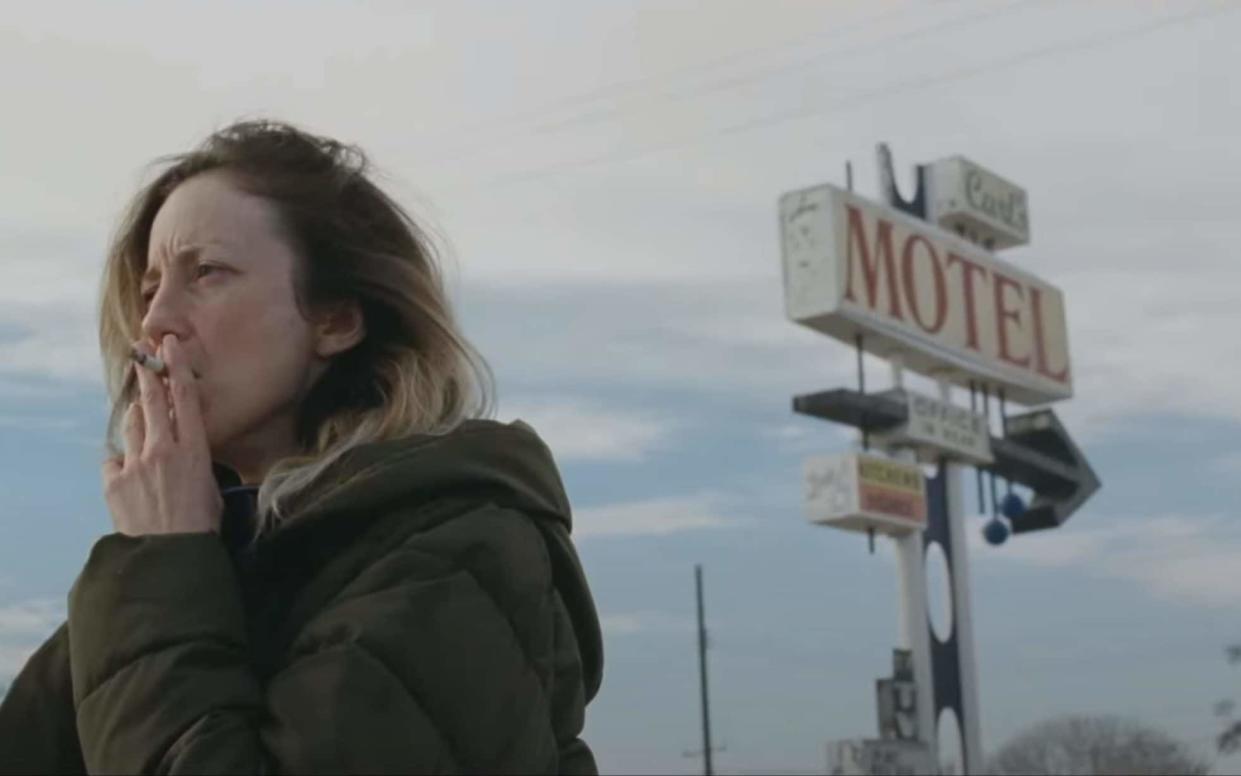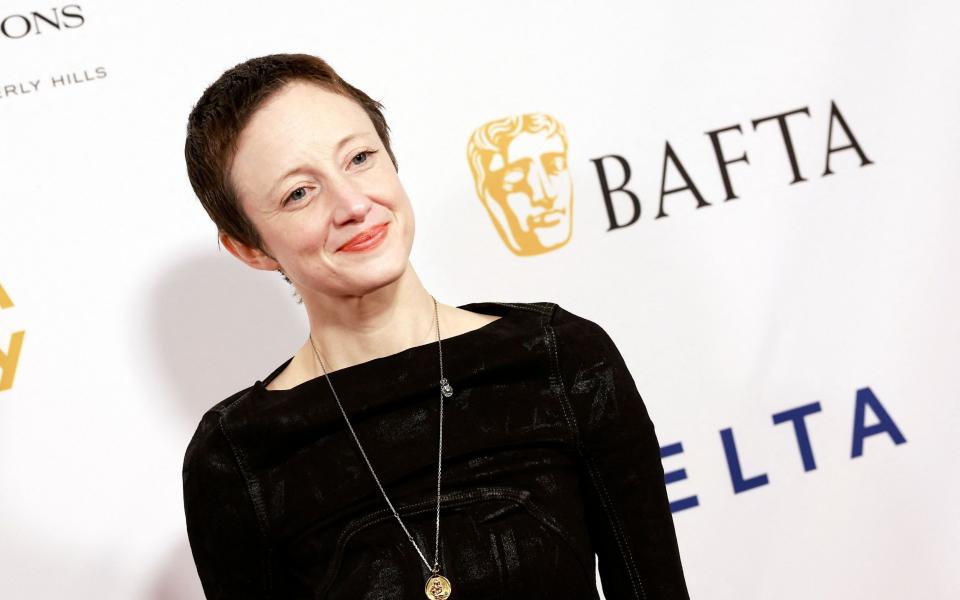The baffling celebrity campaign to get Andrea Riseborough an Oscar

By late January, the Oscar race is usually rounding its last lap: designers are poised, entourages buzzing, even a few speeches scribbled down for the non-superstitious. Everyone has been well prepared, after months of media coverage, for the comeback narratives of a Brendan Fraser or Ke Huy Quan.
Latecomers are rarely admitted to the ball. But an eleventh hour campaign bubbled up this year around To Leslie, a tiny-budget American indie built around a star turn from Andrea Riseborough which has just pounced into the race with a rogue Best Actress nomination – beating out such supposed sure things as Viola Davis (The Woman King) and Danielle Deadwyler (Till).
The consistently chameleonic Riseborough is flat-out great, in a strikingly well-photographed film that’s more than sincere enough to work. The quality of her performance may, or may not, offset the controversy newly bedevilling this nomination: there are factions on Twitter kicking and screaming about who got shoved out, thanks to a campaign largely masterminded – and here come the unfortunate optics – by famous white actors.
The promising film debut of British TV veteran Michael Morris, this grungy redemption drama was shot for under $1m, on a schedule of just 19 days, with a supporting cast featuring the dependable Allison Janney and the comedian/podcaster Marc Maron, rather good in a role originally intended for John Hawkes.
Riseborough’s Leslie is a deadbeat, alcoholic single mom, who won a lottery payout of $190,000 six years before the movie begins. That windfall has long since been spent, and we learn that this skittering wreck of a human abandoned her 13-year-old son (played as a 19-year-old by Owen Teague) in the process.
Released in a handful of cinemas last October, the film failed to find any kind of audience, amassing a grand total of $23,304 at the US box office before being unceremoniously shunted to streaming. (It’s available in the UK to rent on Amazon Prime.) And yet, buoyed by her well-deserved nomination from the Independent Spirit Awards, a grassroots Oscar campaign for Riseborough took hold with startling volume, in the very last weeks before voters’ ballots were submitted.
This praise didn’t just come from critics, who, after all, don’t get to decide the nominees, and haven’t exactly flocked to the film en masse: while it holds a 98 per cent Rotten Tomatoes score, that’s only the aggregate of 54 reviews (compare 287 for Tár). An impressive cross-section of Riseborough’s peers have seen the film, though, hosted screenings in Los Angeles, and pumped their social media feeds full of praise.
Kate Winslet, in the most unrestrained bit of fan worship, called Riseborough’s work “the greatest female performance I have ever seen in my life”. Jane Fonda wrote a testimonial saying she was “bowled over”. Edward Norton wrote an Instagram post calling it “about the most fully committed, emotionally deep, physically harrowing performance I've seen in a while… just raw & utterly devoid of performative BS.” “Even for her this is next level,” tweeted Melanie Lynskey. Further screenings of the film for potential voters were hosted in the run-up to voting by the likes of Jennifer Aniston, Charlize Theron, Gwyneth Paltrow, Sarah Paulson and Courteney Cox.
If actors gushing over actors does not necessarily sound like a fast-track to Oscar glory, question your assumptions: only the members of AMPAS’s acting branch are in control of who get nominated. While Film Twitter has had some sarky fun lampooning this luvvie-fest, gleefully cut-and-pasting raves from Mia Farrow and so forth, the desire to get a share of the spotlight on Riseborough evidently came from a sincere place. Who else gains from it? To Leslie’s US distributors, Momentum, have no money to spend on the kind of promotional campaign that The Fabelmans (say) has received, so they needed all the help they can get.
True, Riseborough is represented by CAA, the top-flight agency which counts Aniston, Spielberg and Tom Hanks among its clients, and undoubtedly some strings were pulled in high places to gain this degree of sudden visibility for her film. Another CAA client with Riseborough’s same manager is Mary McCormack, the charming actress best-known for Murder One and The West Wing, who happens to be the wife of To Leslie’s director, and worked overtime to big up the film to every famous person she knew – including legendary shock-jock Howard Stern, whose wife she played in Private Parts (1997).
There are precedents, of course, for bedraggled takes on addiction and/or destitution gaining Oscar attention, though usually with bigger stars or budgets involved – à la Nicolas Cage in Leaving Las Vegas (1995) or Meryl Streep as another indigent alcoholic in Ironweed (1987). The scale of Jennifer Lawrence’s Ozarks drama Winter’s Bone (2010) is closer to this than those. Also, one of Streep’s co-nominees in that Ironweed year was Sally Kirkland for the otherwise forgotten micro-indie Anna, in which that 46-year-old of modest fame played a Czech wannabe actress trying to make a go of things in New York City.

Kirkland’s one-woman campaign to get nominated is the stuff of legend: some say she wrote letters to every single member of AMPAS, pleading for them to watch her film. She took every interview she was offered, called in favours from Andy Warhol and Joan Rivers, hired two press agents and funded “For Your Consideration” ads out of her own pocket. It worked – at least until the moment that Cher won for Moonstruck. Kirkland’s lemon-sucking expression at the loss is hard to ignore on YouTube.
Melissa Leo took a similar all-stops-out approach to locking down her second nomination for The Fighter (2010) and remaining the front-runner for Best Supporting Actress all season: her personal campaign ads, involving a faux-fur photoshoot and just the word “Consider…”, were almost in danger of turning people off. But The Fighter had the good fortune to be released by Paramount with a hefty promo budget, and got seven nominations, winning two. She was just trying to make sure.
Other attempts to game the system and clamber into the running from nowhere have had mixed success. Ann Dowd gave easily the standout performance in the dubious Compliance (2012), and deserved a push, but Magnolia Pictures refused to pay for awards screeners to be sent out, so she put them on her credit card, overspending the tiny salary she’d been given for making it. The effort didn’t pay off. She must have narrowly missed for Mass last year, and one hopes her time will come.
Meanwhile, David Lynch’s attempt to get Laura Dern recognised for Inland Empire (2006) – a true pipe-dream, given the film’s unwelcoming (if extraordinary) three-hour largesse – has another place in history: with no money to campaign, he simply erected a fold-up chair on the corner of Hollywood Boulevard and La Brea, and sat on it. Next to a cow. And Dern’s face on a giant poster. This was Oscar campaigning coming close to performance art, but alas, Dern didn’t make the cut; nor did Naomi Watts for Mulholland Drive (2001), despite fervent support in the final furlong. (Her nomination for 21 Grams in 2003 felt like a make-up gesture.)
Many of To Leslie’s most effusive celebrity fans have hailed the film overall as a throwback to US indie cinema of the 1970s – the likes of Five Easy Pieces (1970), The Last Detail (1973) or Alice Doesn’t Live Here Anymore (1974). The texture and grit of its best scenes make the comparison worth entertaining, even if the script’s much too easy, engineering Leslie’s salvation with the deus ex machina of a roadside diner she decides to spruce up and run. It’s too heart-on-sleeve an effort, and slightly too cosmetic a portrait of gutter poverty, to really match the hard-knock cynicism of those iconic predecessors.

Riseborough, though, is pretty sensational. She has never given the same performance twice, and does a whole range of revelatory things here with the inebriated set of Leslie’s jaw, her rasping and totally believable accent, her attempts to switch on charm when it might be of use, while barely concealing the self-loathing beneath. Her technique is formidable but not flaunted for its own sake: she pulls it all in under the character’s skin.
She reminded me of Tilda Swinton in Julia (2008) – that’s high praise – and even a little of Emily Watson in Breaking the Waves (1996), a stunning, career-making turn in a considerably more difficult movie, which similarly managed to break the mould and fight its way through to a nomination.
Could she even win? Her stiffest competition, in what everyone thought was a two-way race, comes from two-time winner Cate Blanchett (Tár) and first-time nominee Michelle Yeoh (Everything Everywhere All At Once). As the hoopla surrounding this shock inclusion settles, I’d put Riseborough third and rising.

 Yahoo News
Yahoo News 
